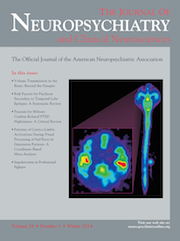A Case of Psychotic Depression Successfully Treated With Sertraline as Monotherapy
To the Editor: Patients with psychotic depression who present delusions and/or hallucinations in conjunction with depressive symptoms are often difficult to treat.1 For the treatment of acute episodes of psychotic depression, the combination of an antidepressant with an antipsychotic has shown greater efficacy than did the antidepressant alone.1 Monotherapy with sertraline, one of the selective serotonin reuptake inhibitors (SSRIs), is reported to be effective, but is not recommended for the treatment of psychotic depression because of its limited efficacy.1 Thus, combination pharmacotherapy is efficacious for the treatment of psychotic depression. However, evidence is lacking regarding the relative efficacy of antidepressant-antipsychotic combination therapy as compared with monotherapy for maintenance or prevention of relapse.1,2 Some international guidelines for the treatment of psychotic depression suggest monotherapy with an antidepressant as a first-line treatment.2 Presented here is a case of patient with psychotic depression successfully treated with sertraline as monotherapy.
Case Report
A 53-year-old woman, without any depressive or manic episode, had cared for her disabled mother for about 20 years. After her mother died, she started living alone and gradually began to feel sad, lonely, and remorseful for insufficiency of her caring for mother. About 5 months later, she developed mood-incongruent delusions of persecution and reference. Her delusions persisted for 2 months, and she was thereafter referred to our hospital. At that time, she was very suspicious and also presented depressive symptoms, including depressed mood, diminished pleasure, appetite loss, severe insomnia, agitation, fatigue, and diminished ability to concentrate. Her 17-item Hamilton Rating Scale for Depression (Ham-D) and Center for Epidemiologic Studies Depression scale (CES-D) scores were 24 and 56, respectively, thus suggesting the presence of a severe depression. She did not have any hallucinations, and her Brief Psychiatric Rating Scale (BPRS) score was 41. She was diagnosed with Major Depressive Disorder With Psychotic Features, according to DSM- IV criteria. The administration of sertraline was initiated at a dose of 25 mg/day, and 1 week later, it was increased to 50 mg/day. About 2 weeks after the initiation of sertraline monotherapy, her depressive symptoms and suspiciousness began to improve. Her delusions disappeared completely 1 month after starting the sertraline treatment. She has subsequently been maintained on 50 mg/day of sertraline without any recurrence of depressive symptoms or delusions for 18 months.
Discussion
Sertraline is shown to be more efficacious than paroxetine for the treatment of delusional depression.1 On the other hand, sertraline monotherapy was reported to aggravate delusions in a patient suffering from psychotic depression.3 Sertraline increases the extracellular concentration of dopamine in the striatum because of its potent inhibition of dopamine transporters,4 which might contribute to the diminution of psychotic symptoms.3 Nevertheless, diminished dopaminergic neurotransmissions in some brain regions, including striatum, are supposed to underlie the pathophysiology of major depression.5 Whatever the underlying mechanism, sertraline monotherapy appears to be an effective treatment for patients with acute episodes of psychotic depression, and it might be useful for the prevention of relapse.
1 : Are antipsychotics or antidepressants needed for psychotic depression? a systematic review and meta-analysis of trials comparing antidepressant or antipsychotic monotherapy with combination treatment. J Clin Psychiatry 2012; 73:486–496Crossref, Medline, Google Scholar
2 : The treatment of psychotic depression: is there consensus among guidelines and psychiatrists? J Affect Disord 2013; 145:214–220Crossref, Medline, Google Scholar
3 : The opposite effects of fluvoxamine and sertraline in the treatment of psychotic major depression: a case report. Ann Gen Psychiatry 2010; 9:23Crossref, Medline, Google Scholar
4 : Sertraline increases extracellular levels not only of serotonin, but also of dopamine in the nucleus accumbens and striatum of rats. Eur J Pharmacol 2010; 647:90–96Crossref, Medline, Google Scholar
5 : The role of dopamine in the pathophysiology of depression. Arch Gen Psychiatry 2007; 64:327–337Crossref, Medline, Google Scholar



